Scarlett Johansson: Blonde ambition
'I’ve often played the “other woman” and I think that’s hard for women to swallow.'
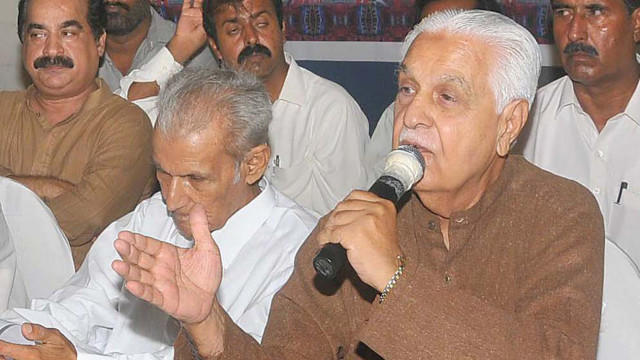
She smiles, gets up and moves. “Where would we be without the good old iPhone?” she says. We’re off on the right foot, then. A-list celebrities can turn uncooperative over a lot less, but Scarlett Johansson looks relaxed. During the afternoon, I had watched from a distance as she inaugurated the harvest at the Moet & Chandon vineyards outside Epernay, France. A grape shear-wielding Tinkerbell in the Neverland sunshine of the Champagne region, with men clustering around her.
A female colleague who had met Johansson warned: “Watch out. She’s as much fun as a lit cigarette in your hair.” Surely not. She’s cheerful, and she looks great. Better than the photos, which says it all. Having read some embarrassing Johansson interviews with male reporters — in which the most challenging question was “Excuse me, are you divine?” — I was determined to interview her as I would a sweaty, mustachioed 60-year-old.
Do you remember your first interview?
Yes, I think it was for The Horse Whisperer. I must have been 12 or 13. It would be bizarre to read it now.
You’ve made all the right decisions since then, to judge by your success. Who decides with you?
When I was younger and living at home, my mom always wanted me to work on things I wanted to do. I never did anything I didn’t want to do. I picked projects that I wanted to see and that I thought were cool. I’ve always hated those trendy slasher movies for teenagers. It seemed that every film I was offered was some kind of bloody mess. I hated them. So I did movies like The Man Who Wasn’t There with the Coen brothers or Lost in Translation. Movies that would fit my aesthetic, I guess.
I read that Robert Redford said about you back then: “She’s 13 going on 30.” Do you think you’re mature for your age?
I grew up in New York, and I was exposed to a lot. I was with adults a lot of the time. I spent many months working with adults. I don’t know, sometimes I feel very much part of my generation. Other times, I think I was born in the wrong era. I feel nostalgic about a period of time I never lived through.
Any period in particular?
Oh, probably the ’40s and ’50s, the Golden Age of Hollywood. I don’t know, it just seems like an exciting time.
Well if that’s what you think, no wonder people say “Scarlett reckons she’s the new Marilyn!”
Well, Marilyn Monroe was a very underrated comedian, certainly. But I think people see it as an aesthetic connection because we’re both blond and buxom and whatever. For a long period of time, there’s been this slender, androgynous aesthetic, and yes, perhaps people confuse the two: style of acting with sex appeal and so on. I’d like to think there was a comparison there, but no I don’t think so. It’s hard to have a perspective on yourself, anyway.
Actresses tend to be more popular with men, and actors with women — that’s obvious. In your case, Scarlett, men seem to be distinctly enthusiastic and women much less so. In other words, does your success with male moviegoers cost you part of your female audience?
I’ve often played the “other woman,” and I think that’s hard for women to swallow. But I’ve also played strong, independent women. I’ve never played a role that was a meek character.
I get the impression that men like you because you don’t scare them. There are women who look like you in an American mall or on a street in Scandinavia. Some other stars look as if they’ve been drawn (by an artist).
Let’s put it like this: being attractive is mystery, allure, confidence. It’s not necessarily physical attributes. Sure, they’re important, too, full lips, big eyes and so on. But for me, sex appeal is something that you exude, it’s the way you move, your delivery. That’s sensual. Cold, threatening, overly confident? That’s just not me.
I don’t think so either.
Thanks.
Lost in Translation is one of my favorite movies. It’s amazing how director Sofia Coppola managed to make a jewel of a movie just in a hotel. Are you surprised at its lasting success? You were 17 when you shot it and 19 when it was released. It was a turning point for you.
Sure, it was a turning point. But when I signed on to do it, I didn’t think anybody was going to see it. It’s not that I didn’t believe in the project, but the script was very short, only 76 pages, so you had no idea how it was going to turn out. A lot of that film is ambience — nothing happens. It’s the music, it’s the lighting, it’s the long-cut shots ...
Just out of curiosity: Was Bill Murray’s character in love with you? It’s something I couldn’t quite work out.
He would have been if he was a little bit younger or she was older, but I think it was more a platonic kind of love. I think she showed him something, and he was guiding her in some way. He kind of comes alive in her presence, and she as well. She is able to transition to another part of her life, thanks to this chance encounter.
Are you happy about Sofia Coppola’s victory in Venice with Somewhere?
Very. It’s wonderful to see a female director win.
I’ll ask you about George W. Bush’s successor, Barack Obama. You were a keen supporter before he was elected. Did you ever think that might hurt you professionally? Some of your Republican fans might not have been happy.
Why not? Part of being a responsible citizen is being politically active. I don’t think about how this might affect my career. Look at Sean Penn. I don’t think he’s really worried about alienating his audience. He’s an incredible actor. The two things have nothing to do with each other. Actors that I know I have a difference of opinion with politically, and they’re outspoken — I’d still go and see their movies. I’m in the spotlight. If there’s a cause or a movement I believe in — and that’s exactly how I felt during the 2008 election, there was a movement — I try to help. Simple.
Drumming up support?
I don’t stand on a soapbox and tell people how to vote. I say ”I support this person. Here’s why.”
Are you a little disappointed in Obama, two years on? Or are you still hopeful?
Hopeful. Not disappointed. I’m disappointed at the divisions in American politics, at the polarisation of our society ...
You should come to Italy.
The media bias is so revolting. It’s very difficult to swallow. I assumed, along with many other supporters (of Obama) that would change. But one thing has nothing to do with the other. It’s an ethical and economic contrast in the media, pushing the country to swing one way or another.
I think it’s a market issue. The media stopped being an independent check when they realized that the public wants to read, listen to and watch people who tell them they are right. In Italy, in Europe, in America.
I agree. And people have learned to accept the status quo. They just want to know that everything’s OK, somehow. They don’t want to question their news source. Now you can find a whole lot of information out there on the internet. But you have to want to go look for it.
They should hang a sign on Western society like the ones on hotel room doors: “Do Not Disturb.”
That’s the way it is. People work so hard in America. They work themselves to death. Especially with this economic climate. I don’t think they have the time or inclination to think about politics or the environment, the big picture. They need simple, easy things. They’re so tied up with the hardship of their life.
I know that you’re very active with Bono’s RED, Oxfam and USA Harvest. Lots of film actors work on behalf of good causes. Aren’t you worried about compassion inflation? Or that some people might doubt your sincerity?
You don’t have to let people know you support charity. But if you want to tell people, “Look, this is a good organisation I traveled with. I know they do good and have a low administration cost,” well, you’ve got to go public.
What mistakes have you made in your life? I’m talking about your professional life.
That’s funny because I was thinking the other day about work and where am I in my career. The entertainment industry is in dire straits right now. (Laughs.) The idea of being a film star is sentimental, but it doesn’t drive the box office — I mean very rarely. You need to think about what it is that you do creatively that’s fulfilling, not what you have to do to get to the top.
So no big mistakes, then?
Some things went well, some things went better than I thought, others bombed. But everything I worked on I’m proud to have made. I’ve got nothing to be ashamed of.
What has helped you most? Looks, personality, style, choices?
I’ve had a very successful independent film career. I’ve worked on a lot of films that were maybe progressive or artistic. I think outside of the box. And that is me. I think that whenever you have an actor that is capable of making choices that are different or unexpected, you want to know what they’re going to do next.
How many movies have you made?
Forty or so.
At the age of 25.
Twenty-six in November.
Where will you be 40 years from now? “Driving Miss Daisy,” director and producer? A grandmother with grandchildren?
Sometimes I think that when I’m older, I’d like to live in New York and act in the theatre, and that will be my life. Other times, I think I’ll go into production and do direction, development, stuff behind the scenes. But in the end, the audience will dictate that, if people are still interested. If the opportunities are there and I don’t have to compromise my taste — well, I’ll keep making movies. Otherwise, fine. I could see myself living a quiet family life, having an organic farm. Who knows? I might sing more Tom Waits songs.
Thank you, Scarlett.
Satisfied? Did you get everything? If not — well, you can always make it up.— NYT Syndication Services
(Beppe Severgnini is a columnist for Corriere della Sera, Italy’s oldest and most well-known newspaper, and author of more than a dozen books, including the best-selling Ciao, America. His most recent book is La Bella Figura: A Field Guide to the Italian Mind.
Published in The Express Tribune, October 31st, 2010.

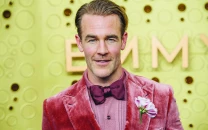
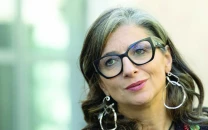
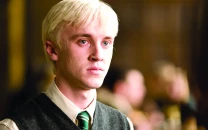

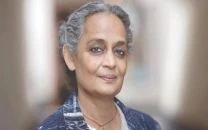
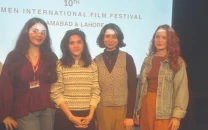












COMMENTS
Comments are moderated and generally will be posted if they are on-topic and not abusive.
For more information, please see our Comments FAQ